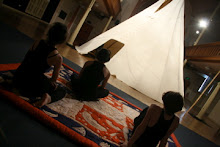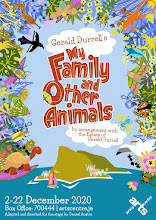
Having locked myself away for the weekend - which is going to have to be a necessity for a number of weekends to come - I have now completed the first draft of one of our six adaptations for My Family and Other Stories.
Taken from Gerald Durrell's Menagerie Manor (1967) it is a fifteen/twenty minute vignette, as they will all be, which will be performed: alfresco / open-air - possibly promenade - up at the Durrell site to assist in animating their 50th. anniversary celebrations at Trinity.
It is astounding that Gerry articulated the following over 40 years ago - it comes in the final chapter, in the FINAL DEMAND:
"A world without birds, without forests, without animals of every shape and size, would be one that I, personally, would not care to live in and which, indeed, it would not be possible for man to live. The rate of man's progress and, in consequence, his rape of an incredibly beautiful planet accelerates month by month, and year by year. It is up to everyone to try to prevent the awful desecration of the world we live in, which is now taking place, and everybody can help in this in however a humble capacity. I am doing what I can in the only way that I know, and I would like your support.
In the meantime, while there are still animals and green places left in the world, I shall do my best to visit them and write about them."
The adaptation / writing process has been a little easier, this time around (compared with our adaptation of My Family and Other Animals in 2006/7 - the very first stage adaptation), due to a greater awareness of the Durrell mission, Gerry's literature, and that we have, more-or-less, confirmed the cast. Writing for particular actors in mind allows for greater clarity. As does having a greater sense of Gerry's voice.
In Dr. Lee Durrell's foreword to the book (May 2007) she writes:
"Poetic and graceful, amusingly sardonic on occasion, but always affectionate, Menagerie Manor is an effortless read."



















